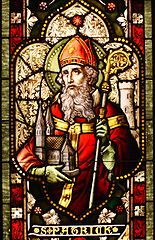
The Life And Writings Of Saint Patrick -Saint Patrick
VII.—PATRICK IN OFFALEY
This ancient and famous kingdom extended from the northern edge of Slieve Bloom eastward to the Hill of Allen, in Kildare, and from Croghan Hill in the north to the Heath of Maryborough, where it joined Leix, on its southern border. With the exception of the Hill of Croghan and the Ridge of Killeigh, it is one vast plain, interspersed with bogs and fertile cluains, as level as the sea, so that looking north from Portarlington, not a single eminence, except the Hill of Croghan, is conspicuous enough to catch the eye. It is one wide expanse of moorland and limestone plain, through which the sluggish feeders of the infant Barrow carry off the drainage of the bogs.
Cathair Mor, the famous Leinster King, who flourished in the second century of the Christian era, bequeathed this territory, as well as a great part of western Kildare, to his eldest son, Ros Failge; and his descendants held the land in the time of St. Patrick. Now, the ruling prince at that time was called Failge Berraide; and when he heard that Patrick was coming into his territory he boastfully declared that he would kill the tailcend in revenge for Cenn Cruach, or Crom Cruach, Failge’s god, whom Patrick had overthrown at Magh Slecht, in Leitrim.
Patrick’s servants heard of those vain boastings: still they concealed their fears from Patrick, who knew nothing of the special danger to which he was exposed in Offaley. But his devoted charioteer, Odran, resolved to save the life of his beloved master, if necessary at the sacrifice of his own. So when they came round the point of Slieve Bloom at Brittas into Offaley, Odran said to Patrick, “I am now a long time driving for you, my good master Patrick; will you take my place to-day and let me sit to rest myself in your place?” Patrick readily granted this request of his old and faithful servant. So they drove northward from Brittas to Killeigh, so far as we can judge, and from Killeigh to the place now called Geashill, but which was then named Bridam—it is in fact the same name under another form. No doubt there was a royal dun at this place, for it was always one of the strongholds of Offaley, and many a bloody struggle took place in its neighbourhood between the Gael and the Saxon in later ages. There it was that the accursed Failge Berraide approaching the chariot of the Saint, gave suddenly a spear thrust to Odran, who sat in Patrick’s seat, and thus received the deadly blow intended for his master. Patrick at once cried out in anger, “My curse”—“on the tree of Bridam,” said the dying Odran, who thus diverted the curse of his master from his slayer to the tree. Patrick yielded too when he saw the great charity of his servant. “Be it so,” he said. ‘Still,’ says the Tripartite, ‘Failge died at once and went down to hell,’ ‘But as to Failge Ross,’ who appears to have been his brother, ‘he meditated no guile against the Saint, and it is his children who are in the land to-day.’ He was the ancestor of the three great families, the O’Conors, the O’Dempseys, and the O’Dunns, who in after times ruled all the land. The O’Conors, the eldest branch of the line, held the kingship for many centuries, and dwelt chiefly at Geashill and at Croghan, where they had a strong fort on the southern slope of the hill. They did not dwell at Philipstown, which was an Anglo-Norman stronghold. O’Dunn’s chief fortress was on the southern border at the foot of Slieve Bloom, and the O’Dempsey, who became Viscount Clanmaliere in the time of Charles the First, had his chief fortress at Ballykeane, about six miles north-west of Portarlington. Patrick blessed their common ancestor, Failge Ross, and the writer of the Tripartite adds that from him is the sovereignty of the land for ever. It was so then and for many centuries afterwards, but Cromwell and King William made many changes in Erin never dreamt of by the holy men who wrote the Tripartite. Still the Gael may get their own again and verify the prophecy.
Patrick was badly treated in Offaley, and, if we can judge from the brief narrative of his journey, he made only a short stay there, merely passing through it. We are not told that he founded a single church or left a single one of his disciples in that territory; yet we find a few traces of him in the district, but very slight ones they are.

 Keep Site Running
Keep Site Running